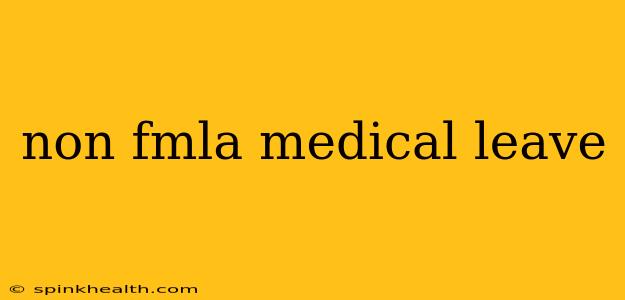Let's face it, unexpected illnesses and injuries happen. Sometimes, they require time off work that doesn't fall under the umbrella of the Family and Medical Leave Act (FMLA). This can leave employees feeling lost and unsure of their rights and responsibilities. This guide aims to shed light on the often-murky waters of non-FMLA medical leave, offering clarity and practical advice.
Imagine this: Sarah, a dedicated graphic designer, suddenly comes down with a severe case of bronchitis. While debilitating, it doesn't meet the criteria for FMLA, which requires a serious health condition affecting major life activities. She needs time off to recover, but she's worried about her job security and pay. This is a common scenario, highlighting the need for understanding non-FMLA medical leave policies.
What is Non-FMLA Medical Leave?
Non-FMLA medical leave refers to any time off taken for medical reasons that doesn't qualify for protection under the FMLA. This typically means the employee's condition isn't serious enough, hasn't lasted long enough, or doesn't meet other specific FMLA requirements. The specifics vary depending on state and company policies. Crucially, it doesn't automatically mean the employee has no rights; companies are still typically bound by state and federal laws regarding employee rights and reasonable accommodations.
How Does Non-FMLA Leave Differ From FMLA Leave?
This is a crucial distinction. FMLA leave provides job-protected, unpaid leave for qualifying serious health conditions. Non-FMLA leave, however, offers no such guaranteed job protection. The leave's availability and terms entirely depend on the employer's policies and applicable state laws. While an employer can choose to provide paid or unpaid leave outside FMLA guidelines, they aren't legally obligated to do so in the same way they are for qualifying FMLA requests.
What are My Rights Regarding Non-FMLA Medical Leave?
This depends significantly on several factors: your employer's policies, your state's laws, and the nature of your medical condition. Many states have their own versions of disability leave laws that may provide some protection even if you don't qualify for FMLA.
Key things to consider:
- Company Policy: Your employee handbook should outline your company's sick leave policy. Review this carefully to understand your rights and how to request leave.
- State Laws: Research your state's laws regarding sick leave and disability. Some states mandate paid sick leave, offering protection beyond what a company's internal policy might offer.
- Reasonable Accommodation: If your medical condition, even if not FMLA-qualifying, impacts your ability to perform your job, you may be entitled to reasonable accommodations under the Americans with Disabilities Act (ADA). This might include modified work schedules, altered duties, or assistive devices.
What if My Employer Doesn't Offer Paid Sick Leave?
This is a challenging situation. Without paid sick leave, taking time off for illness can significantly impact your finances. Explore options such as:
- Short-Term Disability Insurance: This insurance provides income replacement during short-term disabilities. Check if your employer offers it or if you can purchase it independently.
- Personal Savings: Having a financial safety net is crucial in these situations.
- Negotiating with Your Employer: While there's no legal entitlement, you can attempt to negotiate with your employer for unpaid leave or a flexible work arrangement.
How Do I Request Non-FMLA Medical Leave?
Follow your employer's established procedure for requesting time off. This often involves completing specific forms, providing medical documentation (if required), and submitting the request within the timeframe stipulated in company policy. Being proactive and transparent is crucial.
Can I Be Fired for Taking Non-FMLA Medical Leave?
Generally, yes, you can be fired for taking non-FMLA medical leave, unless protected by state law or your employer's policy. However, firing an employee for taking medically necessary time off may raise ethical and potentially legal issues, especially if discriminatory practices are suspected. Always document everything, and if you suspect unfair treatment, consult with an employment lawyer.
In conclusion, navigating non-FMLA medical leave requires careful understanding of company policies, state laws, and your own rights. Proactive communication with your employer, diligent record-keeping, and potentially seeking legal counsel if needed, are key to ensuring a fair and just outcome. Remember, each situation is unique; this guide provides general information and shouldn't be considered legal advice. Consult with a legal professional for personalized guidance.

